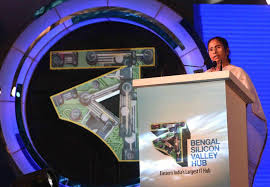August 21, 2018
Bengal’s new IT policy: Focus on quantum computing, AI & big data analytics

The new information technology (IT) policy of Bangla recently unveiled by Chief Minister Mamata Banerjee aims to make the State one of the leaders in the sector by focussing on the new frontier – quantum computing, artificial computing (AI) and big data analytics
The policy was rolled out while launching the Bengal Silicon Valley Hub in New Town last week. According to the policy notification, it will focus on 3D printing, big data analytics, animation and gaming, cyber security, internet-of-things (IoT), robotics, drones, fintech, artificial intelligence, Industry 4.0, quantum computing and a few others.
The new policy would also focuses on augmented reality and virtual reality, blockchain, cyber security and cyber forensics, and data science.
The policy notification also says that Bangla has surged ahead economically and seeks to leverage IT for social welfare and economic development. The State’s vision is to become one of the leading States in the IT, ITeS (information technology-enabled services), ICT (information and communications technology) and ESDM (electronic system design and manufacturing) sectors.
The policy notification further says that the new IT policy would strive to unlock the vast potential of the information technology and electronics (IT&E) sectors to design a paradigm shift in the sector, all the while fostering social welfare.
It aims at enhancing brand West Bengal as an epicentre of cutting-edge R&D in IT and promoting innovation and enhancing contribution to the global value chain, and also fostering social benefits through digital technology and creating an empowered populace.
The policy also aims at accomplishing certain strategic objectives such as creating new jobs in the sector, besides upskilling and reskilling, as well as skilling, the population of the State to empower them to target jobs in the digital economy.
The notification also said that the policy would enable Bangla to transform itself into a knowledge-driven, technologically-enabled welfare society with extensive use of IT and ITeS, therefore increasing employment opportunities and promoting the State as a preferred investment destination.
The objective of an IT&E policy for Bangla is to prepare the state for the future. The new policy stresses that priorities would be given to skill building, ecosystem build-up, entrepreneurship promotion, and spreading the benefits of the IT revolution to tier II and tier III cities.
It has also stressed on the robust physical infrastructure, referring to the third largest road network of the country, 4,000 km of railway tracks and the second largest metro rail network.
Referring to the zero man-days lost in the last five years, the policy describes, according to the notification, Bangla as a state that has a leading rank among all the States in the context of Ease of Doing Business. The policy also refers to Bangla as a power-surplus State.
The policy also states that to reach the vision (as stated in the above paragraphs), three pillars have been conceptualised: Bangla as a hub of innovation with a focus on emerging technology; the operationalisation of high-technology clusters, making the State the preferred IT/ITeS/ESDM destination, thus ensuring its rise in the electronics value-chain; and, hand-holding green cities.
Bangla has been described in the policy as the fourth largest State economy in the country, growing at 15.64 per cent of gross value added (GVA).
